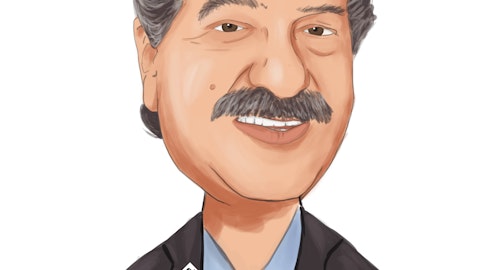A – Unidentified Company Representative: Thank you so much for your time, Minister — Economy Minister, Sergio Massa. Now we are going to start to read the questions that we have been receiving during the whole event. So you can tell us. First question apron has 4 questions, Frank McGann from BofA. He wants to know if the official FX weakness more notably over the next 6, 12 months? How is this likely affect your cash flow generation? How long could it take to adjust gasoline and diesel prices, followup on FX on CapEx?
Alejandro Lew: Thank you, Frank, for your question. I guess, you’re listening. Clearly, that’s the million-dollar question, right? Of course, how we are going to tackle price adjustments. Of course, as was mentioned before, we would expect to continue in a global environment with prices well above average. We would expect to continue, of course, aiming at aligning ourselves, although we understand that reality to be hard to achieve as was demonstrated in recent months or in the last couple of years. But still, if you look at how 2022 price adjustments took place, we managed to improve our dollar-denominated prices or our dollar equivalent prices of fuels in the local market by close to 30%. So tracking very closely what happened in the international markets, of course, with some lags like what we have in the second quarter, where we got to a point where we were almost at 40% discount to international reference prices.
But then we find out — we finished the year at closer to 25% and for what have been seeing or we have been managing along 2023. So far, we’ve been in the range of 15% to 20% discount to international prices. So going forward, we would expect to continue or aiming to continue adjusting prices in a way to compensate to the largest possible extent for the devaluation of the currency. And then also depending on the evolution of international prices, of course, maintaining a relevant correlation to those variables. So in terms of how quickly we could adjust among a steep devaluation scenario if that were to occur, which no one have the ability to predict precisely that will depend — in the past, there were periods where there was a faster adjustment and periods where there was a slower adjustment.
Clearly, we would aim at adjusting as fast as possible to avoid any deterioration in our dollar margins. But that is very hard to predict. And of course, we will need to remain very conscious of the realities of the local economy, the inflationary environment and of course, taking all of those barriers into account, we will aim at maintaining our dollar margins as close to current prices as possible. And then, of course, if we were to suffer — if the country were to have a steep devaluation and if we wouldn’t manage to adjust very quickly, of course, that will affect our cash flow generation. And that’s why we said that we are going to prioritize capital investments because we believe that, that’s the way to generate the most value for our shareholders.
But then if we were to require to cut back on those CapEx plans to maintain financial prudency, that will be the idea to tackle that. But so far, we are not expecting that to happen, we would expect to maintain healthy cash flow generation in the months to come.
Unidentified Company Representative: And the second question that Frank McGann from BofA has is, how are you planning to structure the investment in LNG and VacaMuerta Sur? What stake could take YPF will be structured an independent equity entities? How much should be financial through — sorry, how much should be financed through launch from export agencies or other sources?





